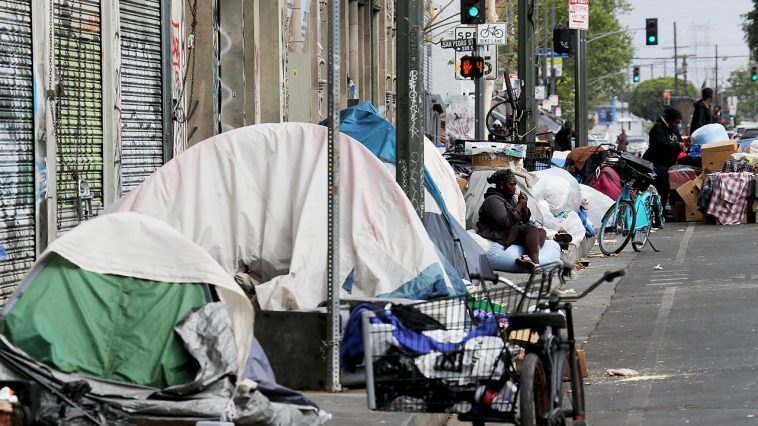The growing homelessness problem in Los Angeles has left those working on the frontlines of the crisis facing their own housing struggles. Research conducted by the RAND Corporation reveals that individuals employed in the city’s homeless services sector generally do not receive a living wage. These workers, including social workers, case managers, outreach workers, and shelter staff, are in direct contact with the homeless population. According to Lisa Abraham, a RAND associate economist and co-author of the study, a living wage for a worker renting a one-bedroom apartment in L.A. is $64,000 per year.
When examining online job postings for frontline homeless services positions, researchers found that the annual salary offered typically ranged between $44,000 and $60,000. This is below the necessary income to afford basic housing in the city, pushing these workers into precarious living situations. Michael Centeno, a case manager for Housing Works, earns around $42,000 per year and has not yet been able to move out of a recovery center, where he shares a three-bedroom apartment with six other men. Centeno, who experienced homelessness in 2016 due to mental health and addiction issues, desires a place to call home where his daughter can visit and store her belongings.
Low wages for workers in homeless services not only lead to housing challenges, but also contribute to burnout in a field known for its impact on mental health. According to a recent study by consultancy group KPMG, there are an estimated 8,000 workers in the L.A. County homeless services sector, with 1,349 job vacancies. The study also found that 53% of these workers have been with their current employer for less than two years, signaling high turnover rates.
This high level of turnover can complicate the process of helping individuals transition from homelessness to secure housing. Mayor Karen Bass has expressed pride for the Inside Safe program, which has moved over 1,200 people from tent encampments to temporary housing in hotels and motels. However, participants in the program often endure long journeys to find permanent homes and can encounter multiple case managers as workers leave the field.
Some residents of Inside Safe have reported not knowing who their case manager is, further evidencing the issues caused by high turnover rates. RAND’s Lisa Abraham suggests that raising pay for frontline service workers could not only help stabilize their living situations, but also indirectly benefit the clients they serve. Higher wages, she argues, can lead to increased morale, reduced stress, and lower turnover rates.
Continuity of care and an improved quality of care can, in turn, enhance the outcomes for clients. The number of individuals experiencing homelessness in L.A. County has continued to climb, with an estimated 69,000 people living without a home on any given night. To confront this crisis, voters passed measures to raise taxes, such as 2017’s Measure H and 2022’s Measure ULA, which represent billions of dollars in investment.
However, the RAND report highlights that these funding efforts have not channeled money toward a living wage for those working on the frontlines of homeless services. This revelation sparked calls for further investment in the workforce. The report was commissioned and funded by the nonprofit Social Justice Partners L.A., for whom racial equity is a primary focus.
Christine Margiotta, Executive Director of Social Justice Partners L.A., emphasized the need to invest in the sector’s workforce by ensuring that employees are paid a living wage. She noted that the majority of frontline workers are Black and brown individuals and that there was already suspicion that their wages were not sufficient for a comfortable standard of living.
The RAND report recommends that philanthropic and government funders change the way they structure grants given to homeless service organizations in order to raise wages. Organizations are often expected to achieve specific results with funding that does not account for the current economic demands in L.A. By modifying the grant process, funders could allow recipients to make cost-of-living adjustments to employee salaries each year.
Celina Alvarez, Housing Works Executive Director, echoed the sentiment, emphasizing the importance of fair increases in contracts to pay employees in homeless services a living wage. She stressed the need for workers to afford a home of their own in order to continue performing their vital roles.
As homelessness in Los Angeles continues to escalate, so too does the pressure on those working to alleviate the crisis. The RAND report underscores the need to support these valuable workers by providing them with a living wage, which could result in numerous benefits for both the employees and the clients they serve.
Improving the living conditions of frontline homeless service workers is not only an ethical responsibility, but also a strategic move. By ensuring that these employees are well-compensated, organizations can reduce turnover rates and improve the continuity of care for clients searching for permanent housing.
The call for changes in funding structures is a powerful one, and it is essential that philanthropic and government funders respond to the needs of homeless service organizations. Providing proper funding to pay employees a living wage will not only help stabilize their own living situations, but also contribute to the overall effectiveness of their work.
Investing in the well-being of frontline homeless service workers sets a strong foundation for addressing the homelessness crisis in Los Angeles. As the number of individuals without a home grows, the demand for compassionate and experienced employees will only increase.
A comprehensive approach to tackling homelessness in Los Angeles must recognize the essential role of the homeless services workforce. By offering fair wages and support for these employees, the city can create a sustainable system that benefits not only the workers but the individuals they tirelessly serve.



